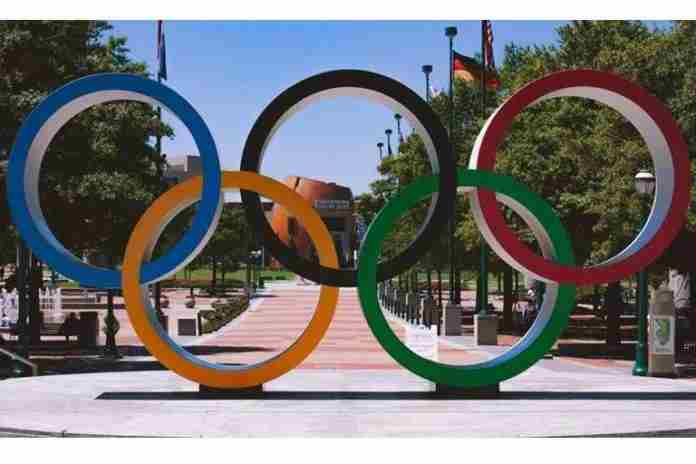(★ Friends: So grateful for our 36th donor toward our December bill for server and support costs; we’re at 84% of our goal. If you would like to help, please donate here. Your enthusiasm is the motivation for this site. ★)
Already dealing with doubts about whether the Tokyo Games will actually take place, the short story in The Times (London) last Thursday (21st) claiming the Japanese government had privately concluded that the event could not take place sent the International Olympic Committee into an all-out offensive on Friday (22nd).
In addition to refuting the story on Twitter, the IOC came out with a seven-and-a-half minute video news release on Friday which featured IOC President Thomas Bach speaking from Lausanne about the situation. He noted that conference calls were held that day with the National Olympic Committees and the IOC membership. And he was resolute about the Games:
● “Six months ahead of the Games the entire Olympic Movement is looking forward to the Opening Ceremony on 23rd July. I had the opportunity today to speak there with all 206 of the National Olympic Committees of the world and they are all fully committed, they are looking forward to these Games.
“We are enjoying the full support of the Japanese government and we had another consultation with all the IOC Members yesterday. Everybody is really determined to make these Olympic Games in six months from now the light at the end of the tunnel in which at this moment we are all still in. But all the prospects are good, we are working hard, and these Games, the first priority will be to make them safe and secure for all participants.”
● “We have been talking with our Athletes’ Commission and they are in regular contact with
the entire athletes community across the globe, and they have all confirmed to us that
the athletes, while being in difficulties at this moment with their training, with the
competition, with the qualification in some sports even, but they are all enthusiastic.
“They are preparing for these Games, they are looking forward to these Games, and I will take the opportunity also in a couple of days to speak with the athletes community also
personally, and to get then a first-hand impression on their attitude. But we know how
passionate Olympic athletes are and this is why we know they will be flexible enough and
they will adjust to this situation we are all in now, and then they will enter the Olympic stadium on 23rd July with full pride and sending an important message not only to the world of sports, but to the entire world – a message of resilience, of Olympic passion and of Olympic values like solidarity and peace.”
● “We are working to prepare for all the potential scenarios we may face in July-August this year and this is a wide range. So we are putting together a huge toolbox of measures and then we will decide at the appropriate time which of the tools we need to address the situation.
“This goes from immigration rules, from quarantine rules, over to social distancing in the Olympic Village, to the question of rapid testing methods, to the question of vaccination, to the question of spectators. How many? Can there be spectators? How will life in the Olympic Village be organized?
“So it’s really a huge undertaking but we are very much encouraged in this because we can see already now that big sports events, even World Championships, are happening and being organized in a safe and secure way, even without having access to any kind of vaccination. So everybody can rest assured our first priority is a safe and secure Olympic Games and when we are talking about the measures there can be no taboo for securing safe and secure Olympic Games for every participant.”
The last sentence is the most important: “there can be no taboo for securing safe and secure Olympic Games …”
This crystalizes the position of the IOC and, for now anyway, the Tokyo organizers and the Japanese governments involved in the Games. If there is any possible way to hold the Games, it will be held:
● If without foreign spectators, fine.
● If without any spectators, fine.
● If without sponsor hospitality, tickets and sales programs, fine. This is also true for commercial partners of the International Federations and NOCs.
● If the Opening Ceremony and Closing Ceremony are whittled down to a limited number of athletes, or even just a flagbearer from each country, fine.
● If there are athletes or teams which cannot be qualified for the Games in some sports due to complications of the pandemic, fine. There may be teams substituted to fill the spots, or just as likely, some slots will be left open (and reduce the athlete population).
● Athletes are already being limited to entry into the Olympic Village five days ahead of their first day of competition and to leave a maximum of two days afterwards; this may be slimmed down even further to keep the Village population down. Fine.
At its core, the Olympic Games in the 21st Century is a television show, with a cast of thousands. As long as the Games is held – and televised – most of what the Games is today is preserved.
Look for the IOC and Tokyo 2020 to seek further opportunities for reduce the number of people at the Games where possible. This could apply not simply to spectators, but because the international television signal from all of the Tokyo venues will – for the first time – be available to rights-holding broadcasters in real time in their own home studios, the number of on-site broadcasters could be significantly reduced.
The IOC’s plan to share post-event news conferences online, in real time, could reduce the number of writers coming to cover as well (but not photographers).
The Tokyo organizers, with the approval of the IOC, could also ask all of the International Federations to forego their usual Congresses at the Olympic Games as well (some have done so already).
There will be further costs attendant to these changes, of course. But in the context of the Japanese national governmental budget for 2021 of 106.6 trillion yen (about $1.03 trillion U.S.), the added costs of $700 million for the postponement to 2021 are certainly manageable. Same for the $1.0 billion costs to the Tokyo Metropolitan Government, out of a budget of more than $68 million.
The experience of the postponement in 2020 and the tumult caused by the story in The Times last week points to one crucial truth: any retreat from having the Games of the XXXII Olympiad will come from the Japanese, not the IOC.
What we see now is that to hold the Games under any circumstances will be declared a victory for Japan itself, for the Tokyo organizers, and the IOC. Keep that in mind as we approach what Tokyo 2020 chair Yoshio Mori has called – on many issues – “a very difficult decision from February to March.”
Rich Perelman
Editor
You can receive our exclusive TSX Report by e-mail by clicking here. You can also refer a friend by clicking here, and can donate here to keep this site going.
For our 709-event International Sports Calendar for 2021 and beyond, by date and by sport, click here!


















